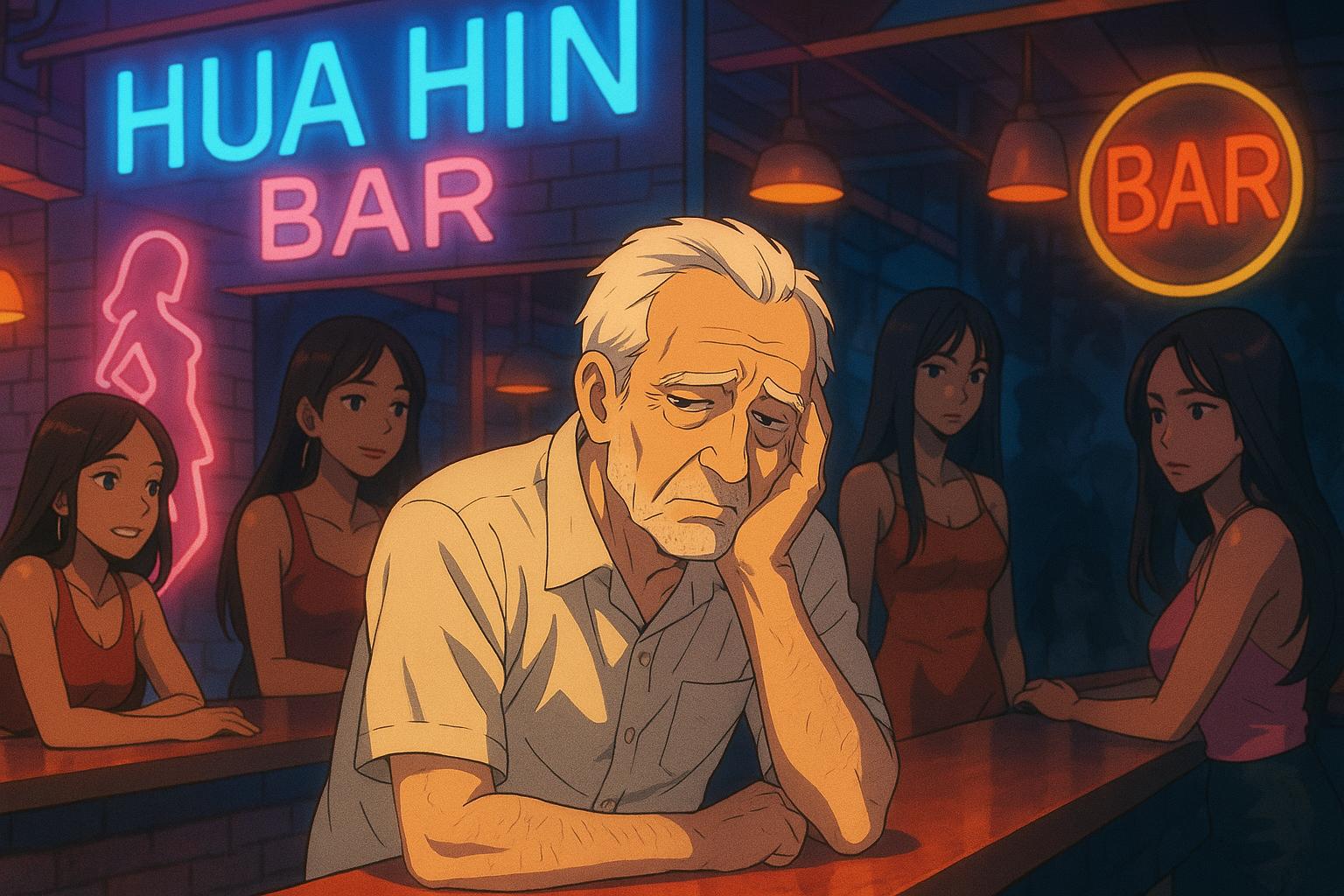In the coastal town of Hua Hin, Thailand, a striking transformation has emerged, turning it into a nexus for elderly Western men seeking companionship with younger local women. The seedy bars along Soi 80, adorned with names like Oops and Cheeky Monkey, are not merely places for cheap drinks, but venues where the hunt for love, or something akin to it, unfolds. A recent survey highlighted the demographics of this burgeoning expat community, revealing that approximately 81 per cent of the expats are male, with a significant portion aged between 66 and 75. Notably, 96.5 per cent of these men reported that their expectations of life in Hua Hin had either been met or exceeded.
However, these statistics gloss over an unsettling reality regarding the motivations of many expats. As exemplified by the shocking case of Graeme Davidson, a 55-year-old former military officer arrested for the alleged murder of his wife in Australia, the narratives of these older men often carry darker undertones. Davidson, who relocated to Hua Hin shortly after his wife’s death—initially claiming it was an accident—has become emblematic of the troubling blend of affluent retirees seeking a fresh start, often fleeing from complicated pasts.
Hua Hin’s appeal lies not only in its allure of tropical living and vibrant culture but also in more permissive visa policies. The Thai government has introduced several retirement visas targeting individuals over 50, drawing many expats who must meet modest financial requirements—either a pension of approximately £1,472 per month or a Thai bank account with around £18,000. This has led to a significant influx of foreign retirees since the introduction of these policies in recent years.
As these men navigate their new lives, they often do so amid questionable ethics regarding age relationships and the local understanding of relationships. Mark, a 65-year-old expat from Cheltenham, illustrates this duality. He finds himself in a relationship with a woman 27 years his junior, reflecting a prevalent desire among older men for younger partners. Mark candidly acknowledges the discomfort surrounding age disparities, noting that his partner has a history of relationships with older men. “The demographic of England is changing, and I don’t feel safe there,” he insists, revealing a deeper sense of alienation.
The thriving expat dating scene is not limited to bars; online platforms like ThaiFriendly have gained traction, enabling connections that are often transactional. Many local women use these platforms not just for companionship, but as pathways to better financial prospects. Despite the illegality of prostitution in Thailand, the lines blur as relationships often morph into financial arrangements. A staggering number of young women grapple with the decisions of balancing emotional connection with economic necessity—facing pressure from societal expectations and financial realities.
However, the issues don't stop at individual relationships. Real estate dynamics reveal a more extensive exploitation narrative, with older men purchasing luxurious properties under their Thai wives’ names, creating situations where young women may leave with significant assets shortly after marriage. Real estate agent Thita Wichaikool has encountered several cases in her career, highlighting the legal precariousness this poses for foreign buyers. “Under Thai law, foreigners cannot own land but can purchase property,” she explains, adding that contracts now often include strict clauses to protect the investments of foreign partners.
Conversely, voices from within the local community tell a different story. Women like Noo Nie, a 29-year-old bar owner, recount their experiences with foreign partners. While she appreciates the care her British boyfriend provides, she also candidly critiques the expectations she sometimes faces, remarking, “Unlike foreigners, Thai men don’t take very good care of their women.” This underscores a complex interplay of affection and transactionality, where relationships are both personal and economically charged.
The atmosphere in Hua Hin is compounded by the influx of stories reflecting its dual personality—both a desirable retirement haven for many and a site shaped by unsettling economic realities. Many women, such as 47-year-old Joy, face difficult choices, migrating from desperate agricultural backgrounds to cities rife with expectations of romantic and economic exchanges. Struggling to adapt, they often confront a new reality where financial support becomes a central tenet of their relationships.
As the nightlife in Hua Hin becomes increasingly vibrant, the spectre of exploitation lurks beneath the surface. Recent incidents involving trafficking minors have cast a shadow, prompting urgent conversations about the local authorities' roles in enforcement amidst these complex relational dynamics. While the streets pulse with life and transactions abound, the question remains whether this idyllic coastal paradise is a genuine haven or merely a backdrop for a complicated and often uncomfortable quest for new beginnings, where the past may not be easily left behind.
For many aging men, Hua Hin represents an opportunity to recreate their lives. Still, as illustrated by figures like Davidson and the myriad personal stories within this expat enclave, the second chances many seek come with risks that may challenge their aspirations for a fresh start.
Source: Noah Wire Services
